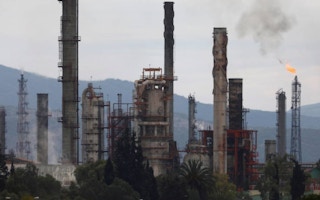The global supply chains of multinational companies such as BP, Coca-Cola and Walmart are responsible for nearly a fifth of climate-changing carbon dioxide emissions, according to a new study.
But the businesses outsource many of these emissions to poorer parts of the world by investing in production in developing countries, said researchers from University College London and China’s Tianjin University.
Dabo Guan, the study’s co-author, called the work the “first quantitative evidence” on the investment flows and carbon footprints of multinational enterprises (MNEs).
“The results were quite shocking. For many large companies, emissions from their supply chains … (are) larger than the emissions of many countries,” he told the Thomson Reuters Foundation.
For example, emissions from the supply chain producing Coca-Cola products is almost equivalent to what China emits in its food sector to feed 1.3 billion people, he said.
Similarly, foreign affiliates of Walmart emit more than Germany’s retail sector while Samsung’s emissions around the world are higher than all electronic manufacturers in India, Thailand and Vietnam, the study found.
A spokesperson for Walmart, the world’s biggest retailer, said the company is aiming to avoid one billion metric tonnes (a gigaton) of emissions from its global value chain by 2030 through an initiative called Project Gigaton.
Since 2017, more than 2,300 suppliers from 50 countries have avoided 230 million metric tonnes of emissions through improvements in areas such as energy, waste and packaging, the spokeswoman told the Thomson Reuters Foundation.
Coca-Cola, BP and Samsung did not respond to e-mails seeking comment.
Carbon dioxide is the main greenhouse gas responsible for rising temperatures. Increased concentration of such gases have already led to an hike in average global temperature of about 1.2 degrees Celsius above pre-industrial times.
Scientists warn that failure to curb the still-growing emissions could lead to crises from food and water shortages to worsening weather disasters and sea level rise.
Investment by MNEs in developing countries “has the effect of reducing developed countries’ emissions while placing a greater emissions burden on poorer countries,” lead author Zengkai Zhang, of Tianjin University, said in a statement.
The study, which looked at data from 2005 to 2016, was published Monday in the journal Nature Climate Change and said multinational companies’ foreign investments accounted for 18.7 per cent of total global carbon emissions in 2016.
The authors said emissions should be assigned to the countries that provide the investment in producing products rather than the countries where they are made to make companies more accountable.
“MNEs can do more and should do more,” said Guan, a professor at UCL as well as Beijing’s Tsinghua University.
Guan said it was crucial for European and American MNEs to set an example for Chinese and Indian companies which have started to invest more rapidly in Africa and Southeast Asia.
This story was published with permission from Thomson Reuters Foundation, the charitable arm of Thomson Reuters, that covers humanitarian news, climate change, resilience, women’s rights, trafficking and property rights. Visit http://news.trust.org/climate.










